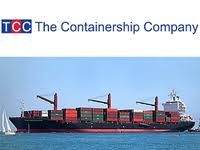
The Containership Company's bankruptcy trustee is seeking $25 million in liquidated damages from approximately 80 shippers who failed to fulfill their cargo commitments
with the short-lived trans-Pacific carrier.
“A contract is a contract,” said Capt. Franck Kayser, managing director of TCC, which operated a no-frills service with chartered ships for a year before ceasing operations and filing for Danish bankruptcy reconstruction in April.
Kayser blamed TCC’s failure on shippers’ failure to meet minimum quantity commitments and on deteriorating rates. TCC relied on non-vessel-operating common carriers for 86 percent of its cargo last year, according to PIERS statistics.
The decision to seek liquidated damages from shippers has attracted wide interest in container shipping. Kayser said he had heard of only a few such cases.
To avoid losing customers, carriers typically waive or negotiate contracts when a shipper falls short of its cargo commitments. But because TCC has ceased operation, its estate is in the hands of a bankruptcy reconstructor or trustee whose obligation is to maximize recovery of the defunct carrier’s assets.
TCC says 83 shippers had cargo shortfalls under their contracts. Kayser said TCC has reached settlements with several of them.
Attorney Marc Richards said the trustee would file claims for damages in U.S. Bankruptcy Court if out-of-court settlements can’t be reached with the others. Richards said the trustee is conducting "due diligence" on how to handle claims against specific shippers. “We hope to move forward with that sooner rather than later,” he said.
U.S. Bankruptcy Court Judge Sean Lane this month approved Chapter 15 bankruptcy protection for TCC. The carrier had sought ancillary U.S. court protection from creditors after filing for primary Danish court protection in April.
Kayser said the TCC estate’s pursuit of liquidated damages from shippers could have far-reaching impact by prodding companies “to review how business is conducted in the containerized industry.”
Bech-Bruun, the Danish law firm appointed trustee in the TCC case, said in a statement that many shippers “enter into legally binding contracts with minimum quantity commitments much larger than they intend to deliver” and depend on carriers not to enforce the contracts.
One of TCC’s non-vessel-operator customers, Globe Express Services, told the bankruptcy court it was unable to meet volume commitments because Shanghai International Port Group, which operates public terminals at the Port of Shanghai “sought to punish TCC for operating its ships from Taicang instead of Shanghai.”
This disruption included threats against Globe Express’ staff, the active blocking of transport and unloading of Globe Express’ cargo on other carriers’ container ships at Shanghai and other actions that made it impossible for Globe Express to conduct the majority of its business in China,” Globe said in a filing in the TCC bankruptcy case.
TCC and its bankruptcy attorneys would not comment on Globe’s allegations.
TCC began liner operations in April 2010, offering a port-to-port service between Taicang, near Shanghai, and Los Angeles. The carrier added a second China call at Ningbo last September and later extended service to a third Chinese port, Qingdao.
Source: The Journal of Commerce
We use cookies to improve your experience. By continuing to use our site, you accept our Cookies, Privacy Policy,Terms and Conditions. Close X